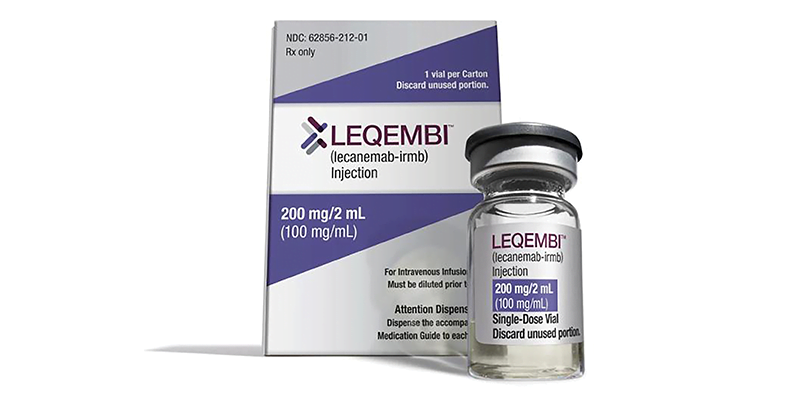New Alzheimer’s Drug a Major Factor
While approval of a new Alzheimer’s drug has understandably raised hope among those suffering from this dreaded disease, its cost has also triggered concerns over how it will be paid for. This is the case particularly with respect to its impact on the Part B premium paid by Medicare retirees.
FDA & CMS APPROVE LEQEMBI
Earlier this summer, the federal Food and Drug Administration. (FDA) granted full approval to the Alzheimer’s drug called Leqembi that is manufactured jointly by Cambridge-based Biogen and the Japanese drug manufacturer Eisai that also has offices/labs in that city.
At the outset, it’s important to emphasize that Leqembi is not a “cure-all” of Alzheimer’s for everyone. Its use has been approved only for people with early forms of Alzheimer’s, meaning those with mild cognitive impairment or mild dementia who have been confirmed to have amyloid plaques in their brains. According to experts in this field, that group constitutes about a sixth of the more than 6 million nationally who are currently diagnosed with Alzheimer’s.
And, officials point out that even for those who may benefit from the drug, it’s not a cure. In an 18-month clinical trial, Leqembi was shown to slow declines in cognitive ability and function by 27%. Simply put, it slows down the disease’s progression.
With FDA’s full approval, the Centers for Medicare and Medicaid Services (CMS) announced that it would expand coverage of Leqembi, broadening access for up to an estimated million people with early forms of the disease. Since Leqembi must be administered intravenously, it will be covered by Medicare Part B.
But the coverage does come with some qualifications. Medicare will cover the approved drug when a physician and clinical team participate in the collection of evidence about how the drug works in the real world, also known as a registry. This information, collected by the registry, will help gauge the usefulness of the medication for Medicare enrollees.
Providers will be able to submit the evidence through a CMS-facilitated portal, which will be free to use. According to the agency, it is working with a number of organizations that are preparing to open their own registries. Clinicians will be able to choose in which registry to participate.
LEQEMBI’S COST: POTENTIAL IMPACT ON MEDICARE
While the positive actions by FDA and CMS are understandably welcome news for Medicare retirees who are suffering from the early stages of Alzheimer’s, they raise questions on their potential impact on the Medicare Part B premium. According to Association President Frank Valeri, “We’re naturally concerned after our experience just two years ago with another Alzheimer’s drug manufactured by Biogen called Aduhelm.”
In 2021, Biogen had received FDA approval for Aduhelm. In order to set aside reserves to pay for the drug’s cost, originally estimated at $56,000 per patient annually which was later cut in half, CMS made exorbitant hikes in Medicare‘s 2022 Part B premiums to which Mass Retirees was strongly opposed.
Eventually, CMS substantially restricted Aduhelm’s usage for Medicare enrollees. As a result, CMS adjusted its premiums for the current (2023) year. And, Biogen shifted its focus away from Aduhelm and to Leqembi.
“That brings us to where we’re at right now, anticipating Leqembi’s potential impact on 2024 Part B premiums that CMS will be announcing after we go to press with the November Voice,” continues Valeri “Indications are that the Part B premium will likely be increasing next year, 2024 .”
Leqembi’s cost is prohibitive at a whopping $26,500 annually, and that doesn’t include the expenses for services related to the treatment including doctor visits and brain scans. One of its manufacturers, Eisai, has estimated that about 100,000 patients will use it over the first three years of availability.
Assuming that all these patients are enrolled in Medicare, the Kaiser Family Foundation (KFF) has determined that the annual Medicare spending on Leqembi would be $2.7 billion. This would make it the third most costly drug covered by Medicare Part B, based on 2021 total Part B drug spending.
What estimates, like those by the KFF, show is that Leqembi’s cost will raise Medicare’s future drug spending. And, this will be reflected in a higher 2024 Part B premium.
According to Kaiser Family Foundation, the Annual Medicare Spending on Legembi would be $2.7 billion.
In March, the Medicare trustees projected that the standard monthly Part B premium may increase to $174.80 in 2024, an almost $10 monthly increase from the $164.90 standard monthly premium that Medicare retirees are currently paying.
But, the trustees’ projection was before the approval of Leqembi. According to The Senior Citizens League, a non-partisan senior group, Leqembi and services related to the treatment may add $5 per month to Part B premiums, bringing the projected premium to $179.80 – a 9% increase in this year’s standard monthly premium.
“Be assured that we’re closely monitoring developments on this issue and updating our members here in our Voice, weekly emails and videos, as well as on our Hotline,” continues Valeri. “Please stay tuned for more.”



